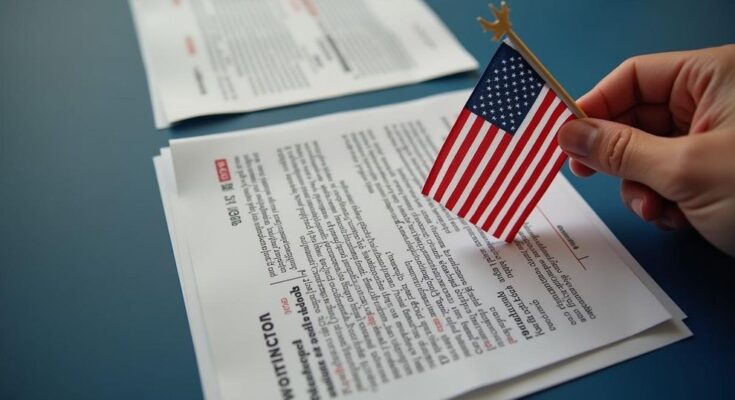The United States Justice Department has sued Virginia for purging voters too close to the presidential election in violation of the National Voter Registration Act’s 90-day ‘quiet period.’ Governor Glenn Youngkin’s executive order aimed to remove voters if citizenship could not be verified, which the Justice Department contends jeopardizes voting rights and violates federal law. This action reflects ongoing concerns regarding voter integrity and the claims of noncitizen voting within Republican circles, despite evidence indicating such instances are rare.
The United States Justice Department has initiated legal action against the Commonwealth of Virginia for its recent voter purging activities that occurred too close to the November 5 presidential election. The lawsuit, filed on Friday, criticizes an executive order from Virginia’s Republican Governor Glenn Youngkin, which empowered officials to remove voters from registration rolls if their citizenship could not be confirmed by the state’s Department of Motor Vehicles. According to the Justice Department, this executive order violates the 90-day ‘quiet period’ mandated by the National Voter Registration Act, which prohibits systematic removals of voters within three months of a federal election. Assistant Attorney General Kristen Clarke emphasized the importance of the voting rights protected under the National Voter Registration Act, stating, “Congress adopted the National Voter Registration Act’s quiet period restriction to prevent error-prone, eleventh-hour efforts that all too often disenfranchise qualified voters. The right to vote is the cornerstone of our democracy and the Justice Department will continue to ensure that the rights of qualified voters are protected.” Governor Youngkin defended his actions, insisting that the executive order was legally compliant. He described the lawsuit as a politically motivated attack on the integrity of elections in Virginia, stating, “Virginians – and Americans – will see this for exactly what it is: a desperate attempt to attack the legitimacy of the elections in the Commonwealth… Virginia’s election will be secure and fair, and I will not stand idly by as this politically motivated action tries to interfere in our elections, period.” This legal confrontation is set against a backdrop where Republican officials have frequently voiced concerns over noncitizen voting, despite a lack of evidence to substantiate such claims. Studies by organizations such as the Brennan Center for Justice indicate that instances of noncitizen voting are exceedingly rare, a finding supported by their investigation of 23.5 million votes cast in the 2016 general election, where only thirty votes were flagged for suspected noncitizen voting, although definitive proof of noncitizen status was not available. In recent years, states including Texas and Tennessee have implemented stricter requirements for verifying voter citizenship, raising concerns among democracy advocates about the disenfranchisement of eligible voters as these measures could disproportionately affect communities of color and low-income individuals. As the 2024 election approaches, it is anticipated that the question of voter registration and the integrity of the voting process will remain a highly contentious issue, particularly among Republican-led states promoting legislation that could hinder voter participation while echoing discredited narratives of widespread election fraud.
The recent lawsuit from the United States Justice Department against Virginia is part of a broader national discourse surrounding voter registration practices and concerns over the integrity of elections. The move follows growing rhetoric among Republican leaders regarding fraudulent voting practices, especially regarding noncitizen participation in elections. Although studies demonstrate that noncitizen voting is exceedingly rare, the push for stricter voter ID laws and registration requirements is gaining traction in several states, purportedly to secure election processes. This context highlights ongoing tensions between state and federal regulatory frameworks concerning voter rights and election integrity, especially in the lead-up to significant elections like the upcoming presidential election.
In conclusion, the lawsuit filed by the United States Justice Department against Virginia underscores significant legal and ethical considerations surrounding voter registration practices close to elections. The contention between the Justice Department and Governor Youngkin reveals deeper national issues concerning the balance between election security and voter accessibility. As soon-to-be implemented laws across various states continue to challenge the voting rights of eligible citizens, it remains imperative to scrutinize how these measures align with the principles enshrined in the National Voter Registration Act.
Original Source: www.aljazeera.com




